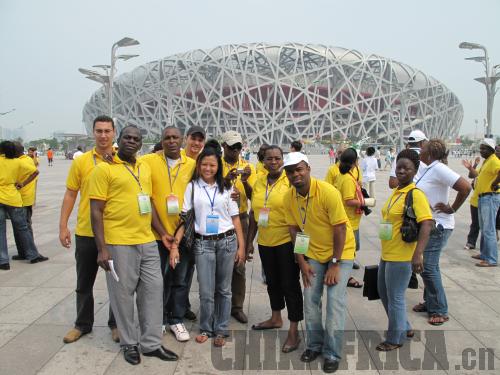|
 |
|
China-Africa Youth Festival (COURTESY OF CYLC) |
Young entrepreneurs
Today, China is Africa's second largest trading partner after the United States. Many ambitious young Africans are coming to China for business opportunities.
In the summer of 2009, YAPS was created. Offering an all-round experience with professional and personal benefits, its members are students, artists, diplomats and business entrepreneurs hailing from Ethiopia, South Africa, Liberia, Mozambique, and everywhere in between. Currently, YAPS boasts about 50 members and growing.
Young Chinese are looking for similar opportunities in Africa. "I know a lot of young Chinese professionals who want to explore opportunities in Africa but lack the knowledge of how to go about it," said Zhang Yipeng, YAPS' lone Chinese staff member. "They don't have friends on the other side. YAPS can be this super platform to meet and build contacts with Africans."
Volunteering
Cameroonian Mahamat Adam has lived in China for 12 years and currently works as a United Nations volunteer. He hopes to better technical and economic cooperation. "I am working to make China-Africa economic cooperation sustainable, helping companies to implement corporate social responsibility in their operations and be aware of environmental issues and job creation in the places they operate." He added that by volunteering he felt he could contribute to a goal that affected him directly. Adam founded a consulting company in China, Africaccess, in 2005.
The Chinese Young Volunteers Serving Africa program, jointly sponsored by the CYLC and the Ministy of Commerce, was launched in 2005, when the first 12 Chinese volunteers were sent to Africa. Since then, a total of 353 volunteers have been dispatched to 15 African countries, serving in medicine, sports, agriculture and education fields.
The Association Internationale des Étudiants en Sciences Économiques et Commerciales (AIESEC), the world's largest youth-run organization, initiated its African projects in 2008. Increasing numbers of Chinese youths are volunteering with AIESEC abroad during their winter or summer vacations. They get involved in HIV/AIDS education, and help school dropouts and local young people to start their own businesses. College student Zhang Wen is among these volunteers.
Zhang, 22, now a senior student at Capital Normal University in Beijing, spent her 2010 winter vacation in an internship program at the Stop Cancer Foundation in Abuja, Nigeria. She worked with other interns to organize campaigns in the local community and spread knowledge about cancer prevention and treatment. The journey turned out to be a big surprise. "Africa isn't about AIDS, poverty and desert. The young people I met are educated, optimistic and enthusiastic. They have a good plan for their future," she said.
Zhang's experience in Abuja was unforgettable. "My stay in Africa has made my character stronger, [more] positive and more open-minded," she said. She felt that Chinese young people should take on more social responsibility, with so many people in the world struggling to access good education.
Future prospects
Tebogo Lefifi is an industrious South African in her 30s. She is the director of consulting company Afric@Work, which provides China-Africa business services, chairwoman of YAPS, and the education director of the South Africa-China Business Association. After her first visit to China in 2008, Lefifi chose to stay to keep ahead of the curve in Chinese-African relations and business.
Lefifi feels the biggest challenge facing African students studying in China was to get real work experience during their studies. "Without any internship record on their profiles, most graduates will be unemployable on return to Africa," she said. "Governments and companies need to put in real investment in the youth – paying university fees is not enought – mentorship and coaching are required." Now YAPS also works to help young Africans secure internships with Chinese companies to gain work experience while they are studying to bolster their understanding of corporate China.
"Back in the continent there are niche opportunities for Africans with technical skills and [fluency in] Chinese language," explained Lefifi. "We need to look at skills and technologies that we can transfer to our own economies and make ourselves relevant in key sectors or trade and exchanges with China." |